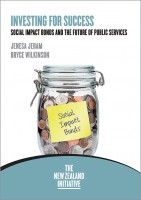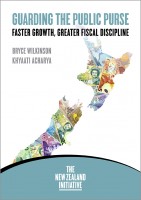Local Government: Passing the NIMBYism buck
Auckland City, Auckland house prices. Politically, that is the government's most immediate local government issue. Read more

Bryce is a Senior Fellow at The New Zealand Initiative, and also the Director of the Wellington-based economic consultancy firm Capital Economics. Prior to setting this up in 1997 he was a Director of, and shareholder in, First NZ Capital. Before moving into investment banking in 1985, he worked in the New Zealand Treasury, reaching the position of Director. Bryce holds a PhD in economics from the University of Canterbury and was a Harkness Fellow at Harvard University. He is a Fellow of the Law and Economics Association of New Zealand.
Bryce is available for comment on fiscal issues, our poverty, inequality and welfare research. He also has a strong background in public policy analysis including monetary policy, capital markets research and microeconomic advisory work.
Bryce was made an Officer of the New Zealand Order of Merit in the 2025 New Year's honours for his significant contributions to public policy formation and economic research, spanning his influential work at Treasury during New Zealand's major economic reforms and his extensive research on fiscal discipline and regulatory quality.
Phone: +64 4 499 0790
Auckland City, Auckland house prices. Politically, that is the government's most immediate local government issue. Read more
This week, The New Zealand Initiative released a report assessing social impact bonds in a New Zealand context. The report identifies both opportunities and challenges. Read more

This report explains the concept of Social Impact Bonds (SIBs), its application worldwide, and its potential in New Zealand. SIBs are a new and innovative means of financing and delivering social services through the private sector, where the government usually only pays for what works. Read more
Your property rights count for very little under the Resource Management Act 1991 (RMA), yet they count for a great deal under New Zealand’s Public Works Acts (PWA) that date back to the 19th century. If the government dictates the future use of your land under the PWA ,you are entitled to compensation but not if it does so under the RMA. Read more

Senior Fellow Dr Bryce Wilkinson discusses The New Zealand Initiative's work on foreign direct investment in New Zealand. Read more
Bloomberg has just published its list of the 15 most miserable economies in the world for 2015. Misery is measured as the sum of the unemployment rate and the inflation rate. Read more
The Parliamentary Commissioner for the Environment (PCE) has hired Crown research institute NIWA to draw up coastal hazard lines. Yet the 2012 hazard line guidance co-authored by NIWA staff fails to define, even in principle, what likelihood such lines are meant to represent, let alone justify that choice in cost-benefit terms. The folly of coastal hazard lines of unknown likelihood and net benefit is illustrated by the experience in 2012-14 of the Kapiti Coast District Council. Read more
Could the Green Party of Aotearoa become an environmental party that was neutral, if not liberal on economic issues? Must it see economic growth and a healthier environment as opposites rather than complements? Read more
Lower prices from productivity gains and lower import prices relative to export prices are a good thing. Yet many overseas commentators worry about price deflation. Read more
One critical response to my 12 January 2015 Dominion Post article here on the need for the benefits from government scaffolding regulation to exceed the costs asserted that: This misses the point that that decisions about people's safety at work should never be based solely on money. There is a moral test that also needs to be satisfied. Read more
We should not pay through the roof for small safety benefits, argues Bryce Wilkinson How would you react to being told that government regulations have added 50 percent to the cost of replacing a tin roof on a house? I ask because a long-standing professional builder told me in a chance encounter shortly before Christmas that scaffolding requirements under the Health and Safety in Employment Act 1992 mean that a small re-roofing job that would have otherwise cost $4,000 may now cost $6,000. Read more

Demographic aspects Projections of an ageing population are robust on the basis of current trends: New Zealanders' 2010 median age of 35.8 years lifts to 43.0 years by 2060 under Statistics New Zealand's medium scenario projections. The number of dependent persons (under 15 or over 64) per 100 people of working age (15-64) is projected to rise by 44% from 50 in 2010 to 72 in 2060. Read more
William Voegeli, a senior editor at Clarement Review of Books, recently gave a speech, The case against liberal compassion, at Michigan's Hillsdale College that raised the question of why many (US) liberals appear to feel that no matter how much governments are spending to alleviate and prevent poverty, the latest amount is always shamefully inadequate. He put US federal spending on welfare, including health and education, in 2013 at 2/3rds of all federal outlays and 14% of GDP. Read more
Last week Tyler Cowen drew attention, in Marginal Revolution, to Vox blogger, Dylan Matthews', opinion that "New Zealand's parliament is better designed than just about any other developed country government". Aw shucks! Read more
A week just spent in the glittering, throbbing city-state metropolis that is Hong Kong, is a reminder that there is a lot more to this place than its stunning night-time skyline. Rolls Royce cars and Ferraris adorn its streets, perhaps to an uncomfortable degree from an egalitarian Kiwi perspective, yet labour-intensive, bespoke suits are still much cheaper than in New Zealand. Read more